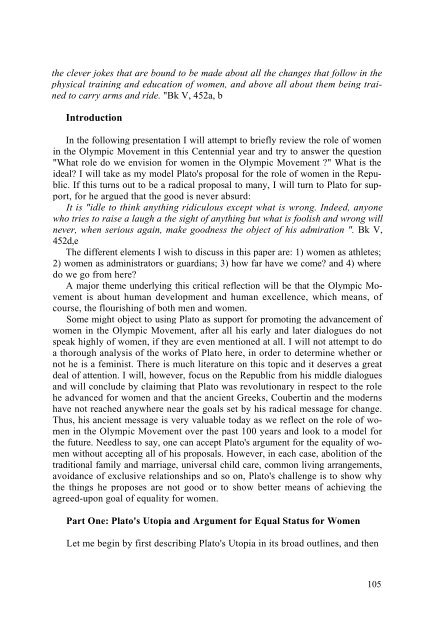Create successful ePaper yourself
Turn your PDF publications into a flip-book with our unique Google optimized e-Paper software.
the clever jokes that are bound to be made about all the changes that follow in the<br />
physical training and education of women, and above all about them being trained<br />
to carry arms and ride. "Bk V, 452a, b<br />
Introduction<br />
In the following presentation I will attempt to briefly review the role of women<br />
in the Olympic Movement in this Centennial year and try to answer the question<br />
"What role do we envision for women in the Olympic Movement ?" What is the<br />
ideal? I will take as my model Plato's proposal for the role of women in the Republic.<br />
If this turns out to be a radical proposal to many, I will turn to Plato for support,<br />
for he argued that the good is never absurd:<br />
It is "idle to think anything ridiculous except what is wrong. Indeed, anyone<br />
who tries to raise a laugh a the sight of anything but what is foolish and wrong will<br />
never, when serious again, make goodness the object of his admiration ". Bk V,<br />
452d,e<br />
The different elements I wish to discuss in this paper are: 1) women as athletes;<br />
2) women as administrators or guardians; 3) how far have we come? and 4) where<br />
do we go from here?<br />
A major theme underlying this critical reflection will be that the Olympic Movement<br />
is about human development and human excellence, which means, of<br />
course, the flourishing of both men and women.<br />
Some might object to using Plato as support for promoting the advancement of<br />
women in the Olympic Movement, after all his early and later dialogues do not<br />
speak highly of women, if they are even mentioned at all. I will not attempt to do<br />
a thorough analysis of the works of Plato here, in order to determine whether or<br />
not he is a feminist. There is much literature on this topic and it deserves a great<br />
deal of attention. I will, however, focus on the Republic from his middle dialogues<br />
and will conclude by claiming that Plato was revolutionary in respect to the role<br />
he advanced for women and that the ancient Greeks, Coubertin and the moderns<br />
have not reached anywhere near the goals set by his radical message for change.<br />
Thus, his ancient message is very valuable today as we reflect on the role of women<br />
in the Olympic Movement over the past 100 years and look to a model for<br />
the future. Needless to say, one can accept Plato's argument for the equality of women<br />
without accepting all of his proposals. However, in each case, abolition of the<br />
traditional family and marriage, universal child care, common living arrangements,<br />
avoidance of exclusive relationships and so on, Plato's challenge is to show why<br />
the things he proposes are not good or to show better means of achieving the<br />
agreed-upon goal of equality for women.<br />
Part One: Plato's Utopia and Argument for Equal Status for Women<br />
Let me begin by first describing Plato's Utopia in its broad outlines, and then<br />
105

















